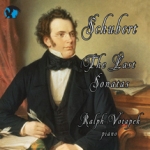Listeners accustomed to modern-day Schubert interpretations may be caught off-guard by Ralph Votapek’s tendency to roll chords not meant to be arpeggiated and to play certain right-hand melody notes behind the beat in the manner of many 19th-century pianists. Not that there’s anything wrong with such “old school” devices, except that they sound more mannered than purposeful here. For example, to break the hands at the outset of the B-flat sonata finale’s main theme after the opening unison G-naturals quickly dissipates the music’s initial urgency. The effect also creates protruding, cloying accents in the main theme of the A major fourth-movement Rondo.
Yet much of Votapek’s playing also attests to his seasoned musicianship, such as the long-lined concentration that helps to sustain his broad slow-movement tempos (his canny spacing of the chromatic D. 959 slow-movement climax, for instance), or the exquisitely articulated outer sections in the D. 960 Scherzo, surrounding a Trio that’s strictly in tempo but full of insightful off-beat accentuations. Incidentally, Votapek does not observe the first-movement exposition repeats. Blue Griffin’s engineering is up to the label’s highest standards, which is saying a lot.
































